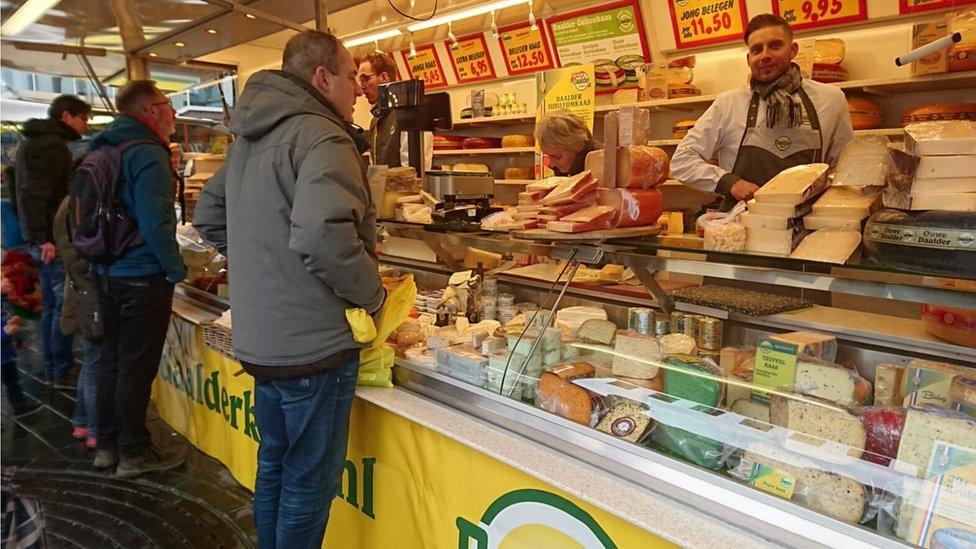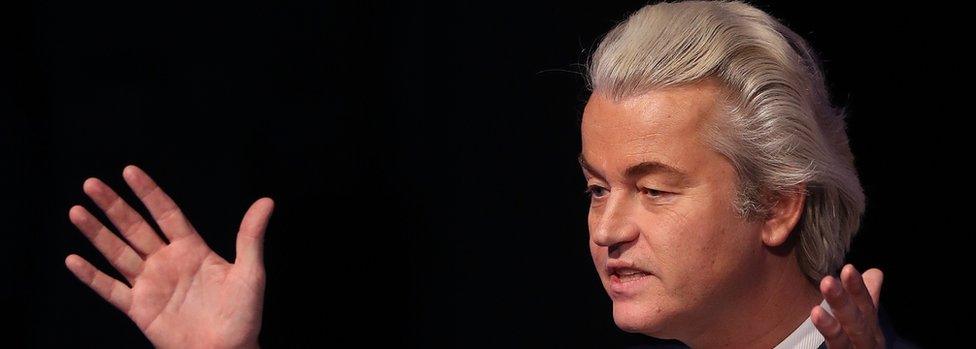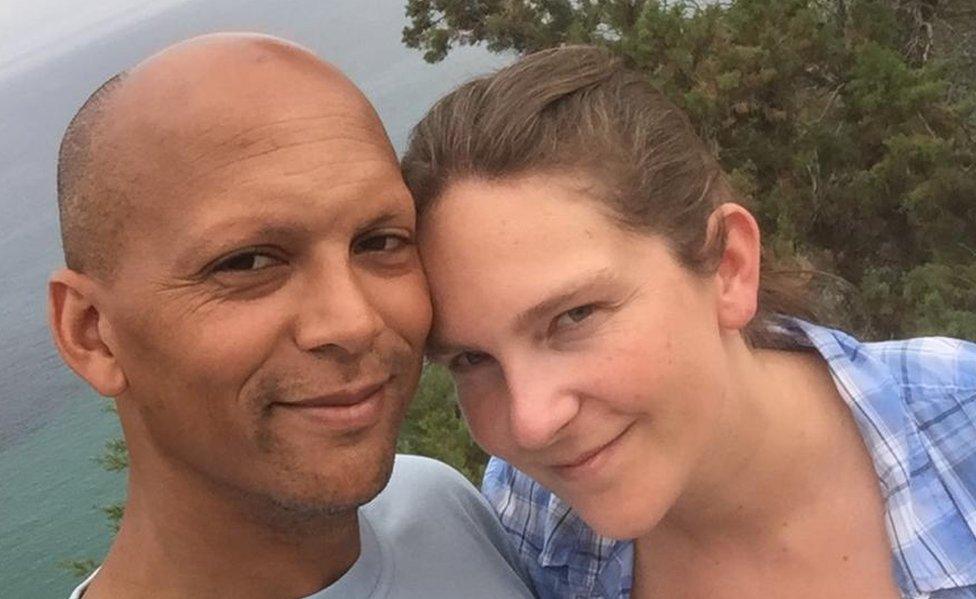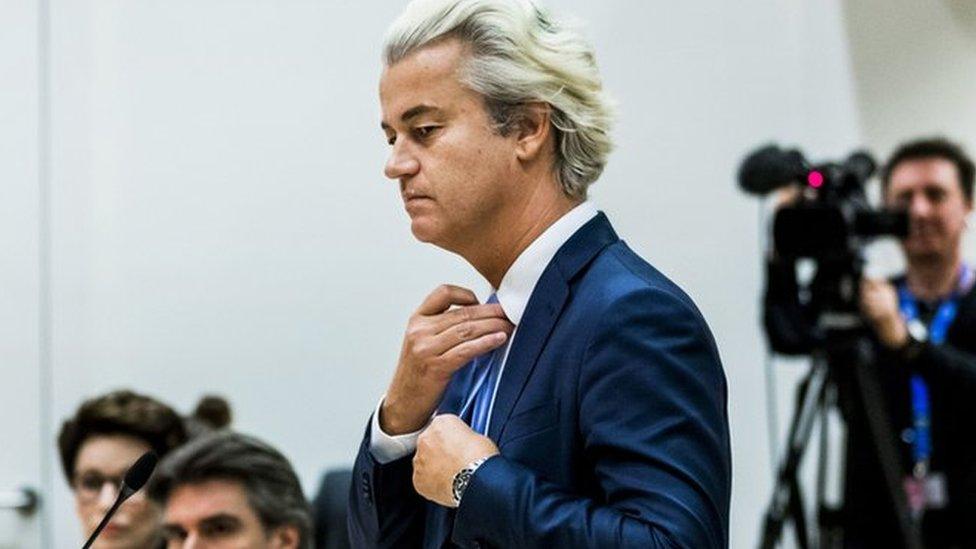Why Dutch populist Geert Wilders is scenting victory
- Published

Almere began as a city in 1976 and now has 200,000 residents
When Dutch populist Geert Wilders promises to stop Islam and make the Netherlands great again, his message finds a ready audience in the country's newest city of Almere.
"It's too easy for people to come here," says Joost, a 60-year-old market trader. "Too many guys from Turkey and Morocco, economic migrants. I have three small children, what kind of world will they grow up in?"
Dutch voters go to the polls on 15 March and Mr Wilders' Freedom Party (PVV) may win the biggest number of seats.
Almere means "all lake", which it was until the 1960s. Then it became a concrete conurbation with affordable homes for people leaving Amsterdam. For several years it has been Geert Wilders territory.
Immigrants now make up about 30% of the population and that ethnic diversity is reflected at the market, where you can find steaming bowls of spicy Surinamese brown beans and headscarves displayed in rainbow fashion.
Behind a thick rack of winter jackets, a woman with dyed-blond hair backs the UK's decision to leave the EU and says the Dutch should do the same.
Ria also complains about a Muslim neighbour. "At New Year I tried to shake his hand and he said he didn't shake hands with non-Muslim women."
Often described as the Dutch Donald Trump, Mr Wilders shares the US president's opposition to Muslim immigration, his distrust of the media and his love of Twitter.
He sparked a "fake news" row on Tuesday by tweeting a photo-shopped picture of a liberal political rival surrounded by radical Islamists, and then accused him of being a "drama queen" when he objected.
But watching Mr Wilders praise Mr Trump's policies has made Ria change her mind about voting for him: "When Trump brought in the travel ban and Wilders said 'Oh yeah we must do that in Holland too', I thought, no, he's crazy, that's not the way."

What Wilders wants:

Geert Wilders was convicted of incitement by a Dutch court last year
"De-Islamising the Netherlands" - no more immigrants or asylum seekers from Muslim countries
No Islamic headscarves in public functions; ban on Islamic expressions that violate public order
Ban on Koran, closure of mosques and Islamic schools
Dutch exit from EU
Deport criminals with dual nationality
Lower income tax, pension age at 65, roll back cuts in elderly care, home care

Opinion polls suggest support for a Dutch "Nexit" in the months after the Brexit vote fell by 8% to 25%. Pollsters say people have realised that leaving the EU would be more complicated than they thought.
"If you sell to other countries and we're not in the EU anymore it's difficult," says Richard as he sells slabs of Edam cheese.
With the financial crisis over in the Netherlands, the economy is growing and has faded as an election issue. Instead, immigration is expected to dominate the campaign.
The pragmatic prime minister, Mark Rutte, launched his election campaign with an open letter warning that anyone who wasn't prepared to "be normal" and accept Dutch culture should get out of the country.
Rights groups accused the prime minister of undermining the constitution. "It's like PVV-light," says Anna Timmerman, director of Human Rights Watch in the Netherlands.
Newspaper columnist Folkert Jensma is concerned his country is losing its "moral compass".
"In my opinion a politician should be very careful and try to keep telling the truth. Is their fear based in reality? If everyone heads off to la-la-land where everyone is scared, we all end up with a president like Donald Trump."
'Groups don't mix'
The Hague suburb of Duindorp is another Wilders stronghold, where 90% are white and 35% voted PVV at the last election. A few years ago, the low-rise red-brick flats here were daubed with racist graffiti including a swastika.
"It's an old fisherman's village. People feel like other people are moving on to their turf," says Linda, who surprised her friends and family by marrying a Muslim from Morocco called Mostafa.

Mostafa (pictured with Linda) doubts the Dutch will back a proposal to deport repeat offenders
The couple were so concerned about discrimination, they considered giving their son Linda's maiden name to protect him from prejudice.
"Groups don't mix. They're afraid of each other because they don't know each other."
Mostafa is in the Dutch army and believes his religion is perfectly compatible with Dutch culture, "because if God, if Allah, did not want homosexuality to exist it would not exist".
He does not think Mr Wilders would be able to push through some of his policies. "I am totally totally convinced that most of the people in the Netherlands are in their heart decent people."
Geert Wilders' party may well top the vote on 15 March but only his most ardent followers think he will become the next prime minister.
The Dutch political system always produces a coalition government, and most other parties have vowed not to team up with him.
But if his popularity encourages enough liberal politicians to adopt his signature policies, Mr Wilders may claim victory even without winning the election.
Correction 8 March 2017: This story has been amended to clarify Mr Wilders' policy on elderly care.
- Published9 December 2016
